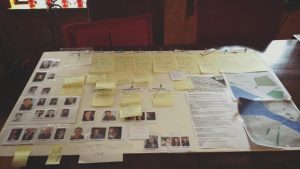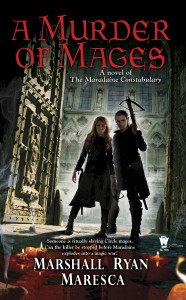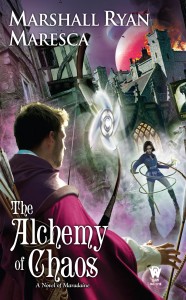Yesterday I got to take my stand-up paddle board out for a jaunt on Lake Sumner in New Mexico. It was a gorgeous day - warm and still, the water cool but not freezing. To my delighted surprise, I hadn't lost my skill with it since last fall. Rather, I'd improved! My balance and strength are much better. I even discovered what should have been a no-brainer, that the way I distribute my weight on the board contributes to the direction I turn as much as the paddling. There's a joy in both doing the work and in discovering I've improved, as much as in the simpler aspects of the sun, peace, and water.
Our topic this week is along those lines. The Business of Writing: How Do You Separate out the Work of Writing from the Pleasure of Writing?
This is one of those aspects of being a writer that tends to plague established authors more than aspiring ones. Don't get me wrong! The whole query-hell aspect of being an aspiring author, or the initial steps of self-publishing and trying to acquire an audience, those are their own special circles of torment. They're kind of like middle school and high school - full of angst and drama. None of us would go back to it for anything. I had dinner the other night with a lovely writer friend who's self-published some work and is in her fourth year of query hell with other work. It's hard. You just have to get through it.
So, yes, getting to be an established writer is better than being an aspiring one, in the way that being an adult is better than being a teenager - much more self-sufficiency, less drama, your own space where you can watch bad movies, drink wine, and eat junk food all night if you want to.
Not that I ever do that.
But, to extend the analogy, it's also more pressure than being a teenager. There are bills to pay. No one stands between you and the consequences of bad decisions. There's no more summers off or writing whatever takes your fancy, taking as long as you like to do it. You have to adult and treat writing like a, well, A JOB.
Because it is one.
And the thing about jobs is you have to do them even when you don't feel like it. When your art pays the bills, it becomes a business. That doesn't mean it CAN'T be a pleasure, but the two don't necessarily go hand in hand.
There's all those inspirational sayings like this one:
Which, in case you were confused, is not something Confucius said. I also found it attributed to Mark Twain. Also, no. I think it's one of those insipid things thought up by success coaches. I say insipid because it implies that if you love what you do it will never feel like work. This won't be news to any of you smart people, but *everything* feels like work sometimes. Anything worth doing takes effort. I love my stand-up paddle board, but sometimes it's a hell of a lot of work, especially paddling into the wind. I love my husband, but sometimes a relationship is work. There's nothing wrong with that.
Let me set that out on its own: THERE IS NOTHING WRONG with work.
There's nothing wrong with business. It's not drinking margaritas by the pool, but neither is writing. In fact, where most arts are concerned, this motivational poster has it spot on.
I know, I know. But really I don't mean that in a depressing way. Think of this: if we all wrote only the fun bits, we'd have 57,000 scraps of fabulous plot-bunnies and one-liners and zero novels or completed stories. Because at some point we have to do the parts we don't love. Sometimes we have to paddle into the wind.
Recently I've been working up a new series for my new agent. (Yes! Totally burying that quasi-secret lead. I'll be able to announce all the details on March 29, because reasons.
Anyway, I'm working up a new idea for her. She wanted ~20,000 words of the first book, and I can write 5,000 words/day when I'm cruising, so I figured I could do this in a week.
HA HA HA HA HA HA!
Turns out not so much. All that *WORLD-BUILDING* doncha know. So there I was, flailing away, with only 3K when I'd hoped to have 10K, beating myself up about it. And it occurred to me that I spent an entire year on the first draft of
THE MARK OF THE TALA. I went and looked it up. An entire year on 80K. Which works out to a little over 200 words/day, for those of you who prefer not to think about math. Sure, I was working full time then, and traveling for the day job A LOT,
But I also had that day job income. I had no agent, no publisher, no contract. I played with that book for a year
because I could. That was still high school for me. Maybe Freshman year of college, when I could still take whatever courses looked interesting because I didn't have to think seriously about my future yet.
Yes, it was fun.
The thing is, writing this new book can be fun, too. IF I can keep from flogging myself with unrealistic timelines and schedules. And if I can keep from fretting about paying the bills. And from worrying about what that scathing review said, or what the market is looking for, or... or... or!
All of this means that, as with all things adulting, it's up to us to find the fun in what we do. It can be a lot like reaching back to our carefree youth and rediscovering those aspects that felt like PLAY instead of
work. When I wrote THE MARK OF THE TALA, I called it The Middle Princess and I just followed the story wherever it led, indulging myself in *my* favorite stuff.
You know what? There is absolutely no reason I can't do that with this book, too. Yes, this is my job, but it's a job I chose out of love. It's hard work at times, sure. It's also a joy.
Finding the fun in effort is a conscious choice.
Instead of thinking about the wind I'm paddling into, I need to focus on the joy of balance, of cool water splashing my feet and the sun warm on my skin. And of the pleasure in finding that I've improved, of discovering a cool new trick.
It's all fun, if we let it be.

























